Medical Profession
A Vocation that gives your work a Vertical Dimension
By Carl Britto, 2nd Year Medical Student from St. John’s Medical College Hospital, Bangalore
Being a doctor gives you a privilege like no other, and the job satisfaction is incomparable to, most and above, being an integral part of some1’s life (patient), often a semi stranger, who places all his trust in you. Whether it is bringing a bundle of joy into this world or preparing a family for the death of a loved one, a doctor is in the midst of it all, playing such a huge role during the most epic moments of life.
The real reward then is not in name, fame and riches, but rather in the joy of alleviating human suffering and the satisfaction of serving mankind. The monetary benefit makes up a less significant aspect of this reward. From the preceding couple of lines, it now becomes evident that being a doctor is more of a vocation, a calling rather than a profession or a sure route to a luxurious life. A vocation is something that gives your work a more vertical dimension, incorporating your profound knowledge and skill with God given ability and grace. You then tend to put your patient’s welfare before your own and live a prestigious life of self-sacrifice.
The time of youth is burdened with choices, broadly between the lucrative aspects of this world and the simple yet noble elements of the spiritual realm. Being a doctor, gives you this choice and it’s the individual who makes the choice. We were made to be courageous, to lead the way and to be the generation which finally makes the change. Healing a patient encompasses the mental, physical and spiritual being of the patient, therefore a doctor, just like a priest, has to be submissive to the Will of God. Just like David, who did not question the size of the stone, similarly we should not question our role as doctors, but believe that all things can be done through Christ, who strengthens us. Whether we have deep water faith in the shallow end or untiring doubts of our capabilities, the goal of a doctor should be to do ‘the Will of God, nothing more, nothing less, nothing else.
Building a Strong Society in Faith – Issac Jacob
"Faith is to believe in the unseen and the reward of Faith is to see what you believe" -St. Augustine Faith is the dynamic element that keeps me going amidst all the disappointments of my life. I see two sets of people in the world. 1. Selfish 2.Selfless.
Most of the people around me belong to the 1st set, but somewhere deep within; I felt I should be selfless. I took this thought to another level. I dreamt of doing something for this society, I wanted to reach people unlike others in a unique way.
My dream troubled me a lot and I was puzzled about what is happening around me. People began changing; support reduced and at last, only one thing kept my feet on the grounds that is faith. The society and the younger generation was a big time concern, I was worried but somewhere inside I felt I was on the right track.
When everyone walked away, when fear surrounded and I needed strength and support, my Faith enabled me, which resulted in forming a dynamic social group called “Sangharsh –for a better changeâ€
My faith in Christ changed me from a just ordinary youth to a social worker and founder in an extra ordinary way.
Finally my dream was just a dream, when it was in sleep, but when I woke up in faith, it started to transform into reality.

Issac Dominic, is a 21 year old BCA graduate, software trainee, social worker and the founder of Sangharsh. His motto is ‘A Youth strengthened by Catholic Faith stand strong for the society.’
Guest post by Youth Speak News (YSN) writer Jeremy Keong
On one level, it kills me how ironic it is that Catholics are relegated to using the term “pro-life†when talking about the issue of abortion. It’s upsetting that in today’s society, the terms “pro-life†and “pro-choice†are seen as separate mindsets and entities.
Catholics are enlightened by God to choose life, writes Jeremy Keong.
No doubt, it’s good that we use the term pro-life. We love life – Christianity is about living life to the fullest (John 10:10)! However, that must also mean that we are anti-murder – which we are. And in the abortion context, we are against the killing of babies, plain and simple. But you know what? Stripping the phrase of all of today’s connotations, Catholics are pro-choice too.
When people tell me, or when I see on the news, that they are “pro-choice,†I just have to shake my head. There exists this notion that because Catholics are all for saving the life of the unborn child, and that under no circumstances is it okay to intentionally take that baby’s life, we are anti-choice. We are against people using their God-given faculty of the mind to make a decision.
Give me a break. Of course Catholics are pro-choice! How can we not be? The entire Christian religion itself is a choice to turn towards God. God reached out to us first, we shunned Him, He sent us His Son and now he simply asks that we respond to this outpouring of love. And from its earliest days, the Church has upheld this truth of choice – the ability to say yes or no. Conversion to the Catholic faith can never be forced – it must be chosen and nurtured by the Grace of God.
Catholics believe that there is always a choice. But furthering that statement, we believe that there is always a correct choice. And the correct choice is always life. Catholics are simultaneously pro-life and pro-choice; enlightened by God to make the choice to choose life.
Work Pressure and Happiness
God overlooks our faults and yet loves us unconditionally. Can we not look beyond other’s faults and still love them?
We, the youth of today, live a life filled with hopes, dreams, ambitions and means to achieve them. We live in a materialistic & selfish world, where we want to fulfill our needs and find contentment in this. Little do we think of those around us or our ability to nurture other’s lives by our ways.
By this, I do not mean only being charitable or reaching out to the poor, sick or the handicapped. I mean nurturing and encouraging people you meet every day; your friends, family or even colleagues.
It is a constant struggle for youth to achieve heights, be competitive and excel in all spheres of life. Now this is surely a great thing to do; no one would like to end up unsuccessful in his life. However we need to sit back and think of how we can achieve our dreams without negative competition or at the cost of someone else.
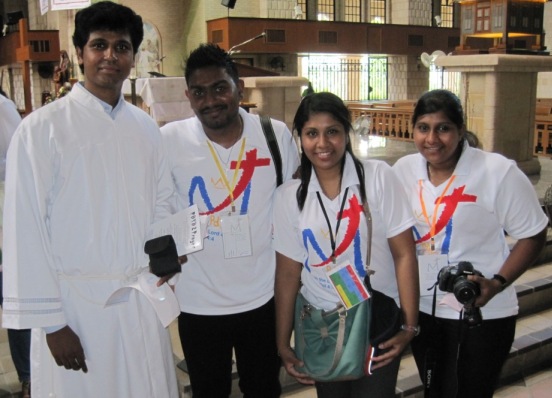
Work Pressure and Happiness
Sometimes when work pressure is high and is in a demanding environment, we all tend to become selfish and focus on our own happiness. It happens to everyone and it is not wrong till you are unaware. But the minute you look around and are cognizant of what’s happening around you, you will find a million opportunities to lend a helping hand.
It could be as simple as saying “good morning” to your watchman or office clerk. You never know what the person is going through; may be your greeting will lighten up their day. Always greet your colleagues however busy your schedule might be; this works as a breath of fresh air and it takes not less than 5 seconds.
Maintaining relationship at workplace
If you have a tiff with your boss or fellow colleague, try not to react by getting upset with the person; as this would be an impulsive reaction and is definitely not God’s way. Instead, try to understand how the issue can be resolved. Keep work relations professional; do not mix emotions with it. It is immensely important to have complete control over your emotions.
Forgive, forgive, and forgive. It takes a strong personality to display anger publically; it takes a stronger one to forgive someone who has hurt you immensely. Pray for those that give you a hard time; this is God’s love in action.
Be assertive, not aggressive. Convey your message politely & not rudely or angrily; anger does not come from God.
Always remember, we are all filled with God’s love in our hearts. This love is overflowing; we just got to make use of it. Do not let a proud or cruel or disrespectful individual dampen your spirits. It is with them that you must display your humility and modesty the most. Treat others the way you want to be treated.
Leading by example and love
As Christian youth, during this year of faith, we all have a big responsibility of leading by example. God gives us opportunities all through the day; we just need to start looking at our lives through His eyes. Do not be a person who is always looking for ways to get upset, to argue, to get offended, and to stay offended. When we learn to walk in the love of God, we are not easily offended. Offense is a choice and we simply choose not to get offended and if we ever get to the point where we get upset, we quickly deal with the matter and move on. Those who walk in love are people that are quick to forgive, slow to take offense, and never looking to cause problems.
Being a humble & an encouraging person is not a difficult task. Think of it, all we will end up doing is leading a fulfilling life & at the same time pleasing God.
Go ahead & start putting these words into action from today.
Roxanne Saldanha, an MBA in HR & Marketing, is currently working at Fidelity Investments in the HR Talent Development space. Her interests include making creative hand-made articles, singing & dancing and extent great support to charitable organizations.
The value of a hard day’s work
Guest post by YSN writer Michael Chen
We have all heard the overused clichés such as “my job is not so fun, but at least the pay is good†or “do what you love and you will feel like you haven’t worked a day in your life.†But what is the value and meaning of work?
There are several reasons for working, whether you are working with a salary or volunteering and sacrificing time for your community.
Whatever your part-time job or future career aspirations, remember that working allows you to apply the talents God has given you to do everyday tasks, writes Michael Chen.
When we work, we give back to the community through our talents. If work sounds tedious, we can remind ourselves that when we work with God in mind, we are fulfilling His plan for us. As we are creations of God, working allows us to apply the talents that God gave us to do everyday tasks. He is glorified because we are using our education, creativity and merit to our full potential. In doing so, we also meet the needs and demands of our community.
When we work, we give back to the community through our talents. If work sounds tedious, we can remind ourselves that when we work with God in mind, we are fulfilling His plan for us. As we are creations of God, working allows us to apply the talents that God gave us to do everyday tasks. He is glorified because we are using our education, creativity and merit to our full potential. In doing so, we also meet the needs and demands of our community.
Labour is meant to be rewarding. If someone volunteers in their community, such as helping in a parish, seniors’ home, school or library, they are working towards the common good. They are benefitting themselves because they not only gain new skills, but they are helping other people. If someone has a paid job, they are meeting their universal need to work and using their skills. In both scenarios, the workers become responsible and gain self-respect, confidence and dignity for the work they do. Not only so, they are also making their communities and economies stronger.
According to Pope John Paul II’s encyclical, “Laborem Exercens,†we are all called to “earn our daily bread†through work.
However, that doesn’t mean that we are simply lowly valued workers to be mistreated as part of an expendable ‘means of production.’ It is apparent in social justice that workers’ rights will need to be protected whenever workers themselves are exploited. We have workers’ rights and the right to create and join unions to protect these rights. “The right to a just wage and the personal security of the worker and his or her family†are some of the rights mentioned in the encyclical. Most importantly, our dignity must be respected when carrying out our duties and participating in society.
As young Catholics, it is hard to overlook the value of money and working to attain it. But we must also consider the spiritual side of working. We are all God’s instruments and with work, we are helping in His service. We should remember that work is “for man†and not the other way around, e.g. a man’s sole purpose is “for work.†We are working to better our society and ourselves and we should never allow work to consume us entirely.
Ultimately, working is meant to be rewarding and fulfilling because we are meeting God’s plan for us. In the encyclical, it is said that “through work, man not only transforms nature, adapting it to his own needs†but he also becomes a more “fulfilled human being.†So perhaps it is true when someone says, “Do what you love and you will feel like you haven’t worked a day in your life.â€
IS EASTER THE BEGINNING OR THE END?

As we are still in the vibe of Easter, let us take a little moment to know, is Easter the beginning or the end ?
When Christ died on the Cross, the earth was filled with darkness which indicates our sins, the very reason for Christ's crucifixion. Then on the third day Jesus Resurrects with Glory which also implies, He is the light, the light which has overcome the darkness of our sin. Very clearly it gives us hope that in Christ Jesus we gain eternal life (John 3:16 For God so loved the world that he gave His only Begotten Son and whoever believes in Him shall not perish but gain Eternal life).
Many of us might be thinking that Christmas is the biggest celebration of the Christians, isn't it ? But my dear friends if you're thinking this, you're wrong! The biggest celebration of the Christian is Easter where Jesus our Lord resurrects defeating the darkness of sin. Our Lord's crucifixion, death and resurrection is the sole reason why we celebrate Christmas.
That is why,
1. Advent is the time of Spiritual Sanctification while Lent is the time of Spiritual Mortification.
2. Lent is the time of cleaning while Advent is the time of decoration.
Easter is clearly the beginning, beginning of New Life in Christ. After nailing our sins to His Cross, for three days we wait in stillness for the Living God. After three days we also resurrect with New Pure lives along with Jesus. It is also the beginning of the missionary life of the Apostles (Matthew 28:19-20 Go therefore and make disciples of all nations. "Baptize them in the Name of the Father and the Son and of the Holy Spirit and teach them to observe all that i have commanded you. I am with you always, even to the end of the world").
So what are you waiting for?
Let's begin!
Jesus loves you.
😇
Reflection by Juliana Rozario âœï¸â¤
Happiness is a road! You have to choose it...
Life will always be full of challenges. As young people none of us can deny that we faced a lot of challenges such as competition with peers and colleagues, stress and burden of workloads, sex antagonism, relationship issues in the family and friends, addicted to mobile phones and social media, pressures of materialism, laziness, lack of support, and most importantly fear, fear of not being able to study, fear of not finding a good job, fear of not being able to satisfy parents, fear of rejections, fear of relationships and fear of failures, etc and the list goes on. In spite of all these challenges, many are still living a happy life while there are more who are not happy with their own life and experience sorrows and sadness all the time, stressed and worries, despair and lonely. They considered life as a burden and are stressed where you don’t see any life at all in such people. With the rapid changes and development of this century, they are unable to face the challenges of life and as a result, they give up and lose focus.
Often we thought that people who have more wealth live a better and happy life than the poor. But, have we ever wondered what is the real reason and the difference between the young people who live a happy and youthful life and those of another who live a sad and life full of worries and tensions. While the problems and challenges are almost similar for young people, the former considered obstacles and problems as part of life, whereas the latter are more downward and withdrawn. They are just the opposite and considered life as a burden and thought that life is stressful for them to live. The fact remains that none of them understand that no one here on earth can avoid such challenges and obstacles in life.
Being poor or rich either does not have to do anything with living a happy and youthful life. I remember years ago when I was taken to the middle of a slum for an exposure. Just before entering the area I had a thought that the people who lived in there are very poor and experience all kinds of challenges that half of these have never met my journey of life. Few metres away from the main road, I saw children playing among themselves and I could see them using their full potential and freedom to play with so much noise and laughter. What caught my attention were the two children who look at the half broken mirror nailing on a big tree. Both of them pointed fingers to the broken mirror one after the other and laughed out loud with so much joy and happiness and at times holding their stomachs bending their whole body down while laughing. Probably, I thought the night before I slept that the two boys might have done something funny that day or somewhere at the time they saw their own faces, which might have looked funnier when they were standing in front of the mirror. Anyway I thought that is normal because there were days that I too would look at the mirror and laugh at my own self for no reasons than seeing myself as a funny person and sometimes appreciated my own self for certain things and looks.
A few days later, I met a friend of mine who shared with me stories about his own girl friend along with several complaints and that she is very obsessed about her looks which does not make her happy at all. “She would always stand in front of a big mirror attached to her cupboard and use different varieties of cosmetics to make look better and better but never been satisfied of her appearance and with much worries she always complained about herself and her look which made her live a life full of worries and sadness when she compared herself with others”, he said. “Comparing yourself with others to seek self and positive improvement is wise, unless it costs you your own happiness and satisfaction”, I interrupted as if I wasn’t aware that many youngsters would fall for that kind of destructive obsession and comparison.
After our long conversation I remembered the incident of the half broken mirror and the two boys living in the slum. Such a luxurious life of the girl they can never afford in their life, I thought. Yet, what mesmerised me was their laughter and happiness looking at their own faces with no facial make up, while the girl in a full mirror was disheartened and couldn’t accept her own look. Happiness is not about being rich or poor. It is not about how much or how little you have. What makes the boys happy is not the half broken mirror, but their ability to accept who they are unlike the girl who had a big and expensive mirror but couldn’t accept her own reality.
Happiness is the road. You have to choose it and the first secret to this journey is to know yourself and accept who you are and your reality. Knowing yourself means to be aware of who you are what kind of a life you want and what kind of a person you want to be. When you accept yourself, it means that you know your own attributes and seek positive improvement through reflection rather than immediately react to the comparison you made with others.
The second thing that a wise man would do to make himself happy is to count the importance of his relationships with others and with God. An unhappy man can be seen through his struggle of loneliness and discomfort, both within his social group and within his family. To achieve happiness, a healthy relationship is needed starting with oneself, others and God. Communication is the key to achieve this. I remember the days when my younger brother and I hadn’t spoken to each other for several weeks because I’d beaten him. My gloomy days started then and it made me uncomfortable and unhappy until one day the inner strength which I believed comes from the Lord to whom I prayed, gave me the courage to apologise and seek forgiveness from him. The moment he replied, I was filled with a joyful spirit and danced to the tune of mercy. As I shared this with one of my friend through a phone call, he narrated a story he read in one of the newspapers that a 17 year old boy committed suicide because he failed in his matriculation exam. Unable to communicate this to his parents and thinking that they will reject him, he jumped from a high roof of the building. Had the boy communicated his situation to his parents and friends, I think they would not want him to lose his life ad they would’ve encouraged him to do well next time.
Communications makes it easier to understand and know each other, it makes it easier to live and work together, to forgive one another and to establish our personal bonding as brothers. Today, the rising trend of interactions takes place by means of images through computers and mobile phones. In fact, it seems that our efforts to establish and strengthen that personal relationship is much lesser than in the old childhood days where a family was able to spend time to sit and live together. Majority of us are trapped in this medium and it seems that sharing an image of a friend who celebrated birthday in our whatsapp status or facebook stories is more attractive and considered more importance than calling or meeting a person personally to wish him/her.
Ultimately the result we see is the personal bonds being shattered day by day. The lack of time for sharing, is one of the major reasons for the young people to be isolated and live with worries, despairs and fears. A wise and happy young man would always understand the importance of sincere care and find time in all his busy schedules to sit around with his family, meet friends, interact and share with others.
JIMMY PDANG
The Evolution of the Church (The 21 Ecumenical Councils)

Aside from the first general gathering of the bishops of the Church—the Council of Jerusalem, which occurred around A.D. 50 (Acts 15) and which is usually not counted as an ecumenical council—there have been 21 ecumenical or general councils of the bishops of the Catholic Church. (The Eastern Orthodox Churches recognize the first seven as ecumenical councils.)
A council is recognized as ecumenical once its works are approved by a pope. The pope does not need to attend a council for it to be an ecumenical council. The earliest councils were held in the East, and the reigning popes usually sent legates to represent them. Later these popes approved the decrees of the councils, thereby verifying that they were ecumenical councils.
Some councils, such as Ephesus, have been mainly doctrinal in their work; others, such as Vatican II, have been mainly pastoral. Doctrinal definitions are capable of being promulgated infallibly; pastoral decisions, although binding, are not subject to infallibility.
1. Nicaea I
325
Pope Sylvester I, 314-335
Emperor Constantine, 306-337
Decisions: Condemned Arianism, which denied the divinity of Christ (elements of Arianism have reappeared in our own time); defined the consubstantiality of the Father and the Son; fixed the date for Easter; began formulation of Nicene-Constantinopolitan Creed.
381
Pope Damasus I, 366-384
Emperor Theodosius, 379-395
Decisions: Recondemned Arianism; condemned Macedonianism, which denied the divinity of the Holy Spirit; completed the formulation of the Nicene-Constantinopolitan Creed.
3. Ephesus
431
Pope Celestine I, 422-432
Emperor Theodosius II, 408-450
Decisions: Condemned Nestorianism, which denied the unity of the divine and human in Christ; defined that Mary is the Mother of God (Theotokos), a doctrine denied by the Nestorians and by most of today’s Protestants; condemned Pelagianism, which held that man could earn his own salvation through his natural powers.
4. Chalcedon
451
Pope Leo the Great, 440-461
Emperor Marcian, 450-457
Decisions: Condemned Monophysitism (also called Eutychianism), which denied Christ’s human nature.
553
Pope Vigilius, 537-555
Emperor Justinian I, 527-565
Decisions: Condemned the Three Chapters, writings tainted by Nestorianism and composed by Theodore of Mopsuestia, Theodoret of Cyr, and Ibas of Edessa.
680
Pope Agatho, 678-681
Emperor Constantine IV, 668-685
Decisions: Condemned Monothelitism, which held Christ had but one will, the divine (this heresy arose as a reaction to the monophysite heresy); censured Pope Honorius I for a letter in which he made an ambiguous but not infallible statement about the unity of operations in Christ (an episode commonly used by anti-Catholic writers as an argument against papal infallibility, but for the real meaning, see Catholicism and Fundamentalism, pages 227-229).
7. Nicaea II
787
Pope Hadrian I, 772-795
Emperor Constantine VI, 780-797
Decisions: Condemned iconoclasm (which was mainly confined to the East), a heresy that held that the use of images constituted idolatry; condemned Adoptionism, which held that Christ was not the Son of God by nature but only by adoption, thereby denying the hypostatic union.
869
Pope Hadrian II, 867-872
Emperor Basil, 867-886
Decisions: Recondemned Adoptionism; deposed Photius as patriarch of Constantinople, thereby ending the Photian Schism, but this did not completely remove disaffections between the West and the East (in 1054 came the final break, when the Eastern Orthodox Churches broke away from unity with Rome).
9. Lateran I
1123
Pope Callistus II, 1119-1124
Emperor Henry V, 1105-1125
Decisions: Confirmed the Concordat of Worms (1122), in which the Pope and Emperor sought to end the dispute over investiture (the attempt by the secular powers to assume authority in appointing bishops; this was a main source of Church/state friction during the Middle Ages).
10. Lateran II
1139
Pope Innocent II, 1130-1143
Emperor Conrad III, 1138-1152
Decisions: Ended a papal schism by antipope Anacletus II; reaffirmed baptism of infants; reaffirmed the sacramental nature of the priesthood, marriage, and the Eucharist against Medieval heretics; decreed that holy orders is an impediment to marriage, making the attempted marriage of a priest invalid.
11. Lateran III
1179
Pope Alexander III, 1159-1181
Emperor Frederick Barbarossa, 1152-1190
Decisions: Regulated papal elections by requiring a two-thirds vote of the cardinals (see in this issue the article by Canon Francis J. Ripley, page 27); condemned Waldensianism and Albigensianism, a form of Manichaeanism (an ancient heresy that held that matter is evil; Albigensians opposed the authority of the state and of the Church, opposed the sacrament of matrimony, and practiced ritual suicide; despite these tenets, many anti-Catholics believe Albigensianism was the continuation of “real Christianity” during the Middle Ages and was a forerunner of Protestantism).
12. Lateran IV
1215
Pope Innocent III, 1198-1216
Emperor Otto IV, 1209-1215
Decisions: Ordered annual reception of penance and the Eucharist; used the term “transubstantiation” to explain the Real Presence of Christ in the Eucharist; adopted further canons against the Albigensians.
13. Lyons I
1245
Pope Innocent IV, 1243-1254
Emperor Frederick II, 1220-1250
Decisions: Excommunicated and deposed Frederick II for heresy and crimes against the Church.
14. Lyons II
1274
Pope Gregory X, 1271-1276
Emperor Rudolf I, 1273-1291
Decisions: Effected only temporary union of the Eastern Churches with the Roman Church; promulgated regulations for conclaves.
15. Vienne
1311
Pope Clement V, 1305-1314
Emperor Henry VII, 1308-1313
Decisions: Suppressed the Knights Templars; issued decrees on the reform of morals.
16. Constance
1414
Popes Gregory XII, 1406-1415
Emperor Sigismund, 1410-1437
Decisions: Ended the Great Schism, which involved three rival claimants to the papacy (see in this issue the article by Canon Francis J. Ripley, page 27); opposed the teachings of John Wycliffe, who taught sola scriptura, denied the authority of the pope and bishops, denied the Real Presence of Christ in the Eucharist, and wrote against penance and indulgences; condemned as a heretic John Huss, who denied papal authority and taught wrongly about the nature of the Church and who was burned at the stake in 1415 (in 1457 his followers established what became known commonly as the Moravian Church, which was the first independent Protestant church).
17. Florence
1438-1443
Pope Eugene IV, 1431-1447
Emperors: Albert II, 1438-1439
Frederick III, 1440-1493
Decisions: Reaffirmed papal primacy against claims of conciliarists that an ecumenical council is superior to a pope; approved reunion with several Eastern Churches, but the reunion was only temporary.
18. Lateran V
1512-1517
Popes Julius II, 1503-1513
Leo X, 1513-1521
Emperor Maximilian I, 1493-1519
Decisions: Opposed erroneous teachings about the soul; reaffirmed the doctrine of indulgences; restated the relationship between popes and ecumenical councils; on the eve of the Protestant Reformation, failed to inaugurate an authentic and thoroughgoing reform of the Church, inadvertently helping Protestantism.
19. Trent
1545-1549, 1551-1552, 1562-1563
Popes Paul III, 1534-1549
Julius III, 1550-1555
Pius IV, 1559-1565
Emperors Charles V, 1519-1558
Ferdinand I, 1558-1564
Decisions: Affirmed Catholic doctrines against the errors of the Protestant Reformers; reaffirmed teachings on the role of the Bible and Tradition, grace, sin, justification by faith (but not by “faith alone”), the Mass as a real sacrifice, purgatory, indulgences, jurisdiction of the pope; initiated the Counter-Reformation; reformed the clergy and morals; promoted religious instruction; ordered the establishment of seminaries for the future training of priests.
20. Vatican I
1869-1870
Pope Pius IX, 1846-1878
Decisions: Defined papal infallibility and primacy; condemned errors regarding the relationship between faith and reason (the council was cut short by war, its work to be taken up again by Vatican II).
21. Vatican II
1962-1965
Popes John XXIII, 1958-1963
Paul VI, 1963-1978
Decisions: Issued pastoral documents on the renewal and reform of the Church, intending the make the Church more effective in dealing with the contemporary world.
SOURCE: https://www.catholic.com/magazine/print-edition/the-21-ecumenical-councils
One year since the Synod on Youth……
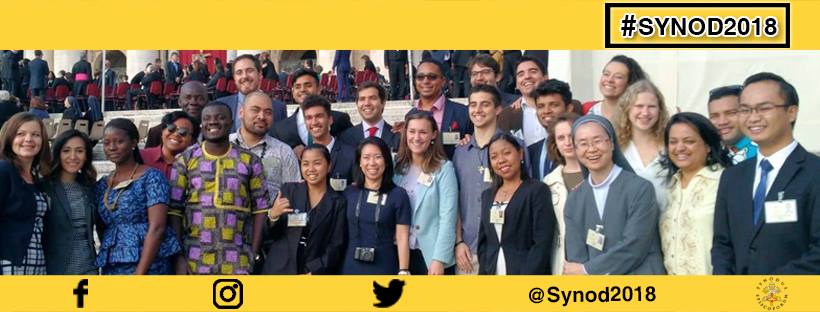
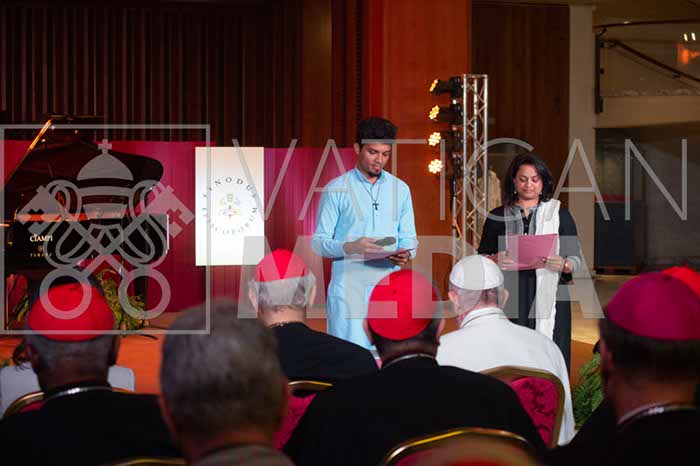
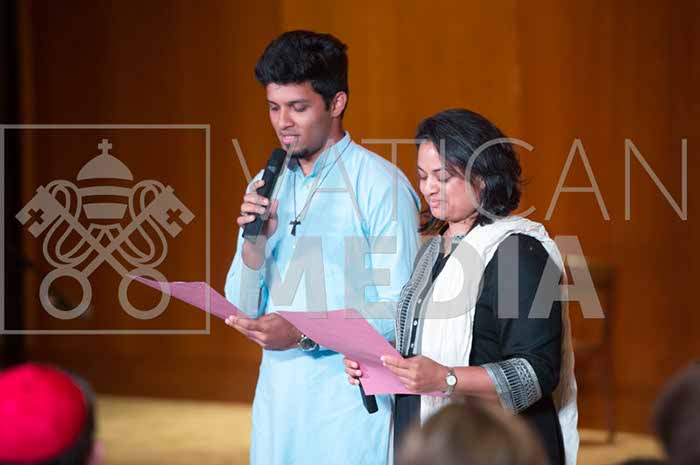

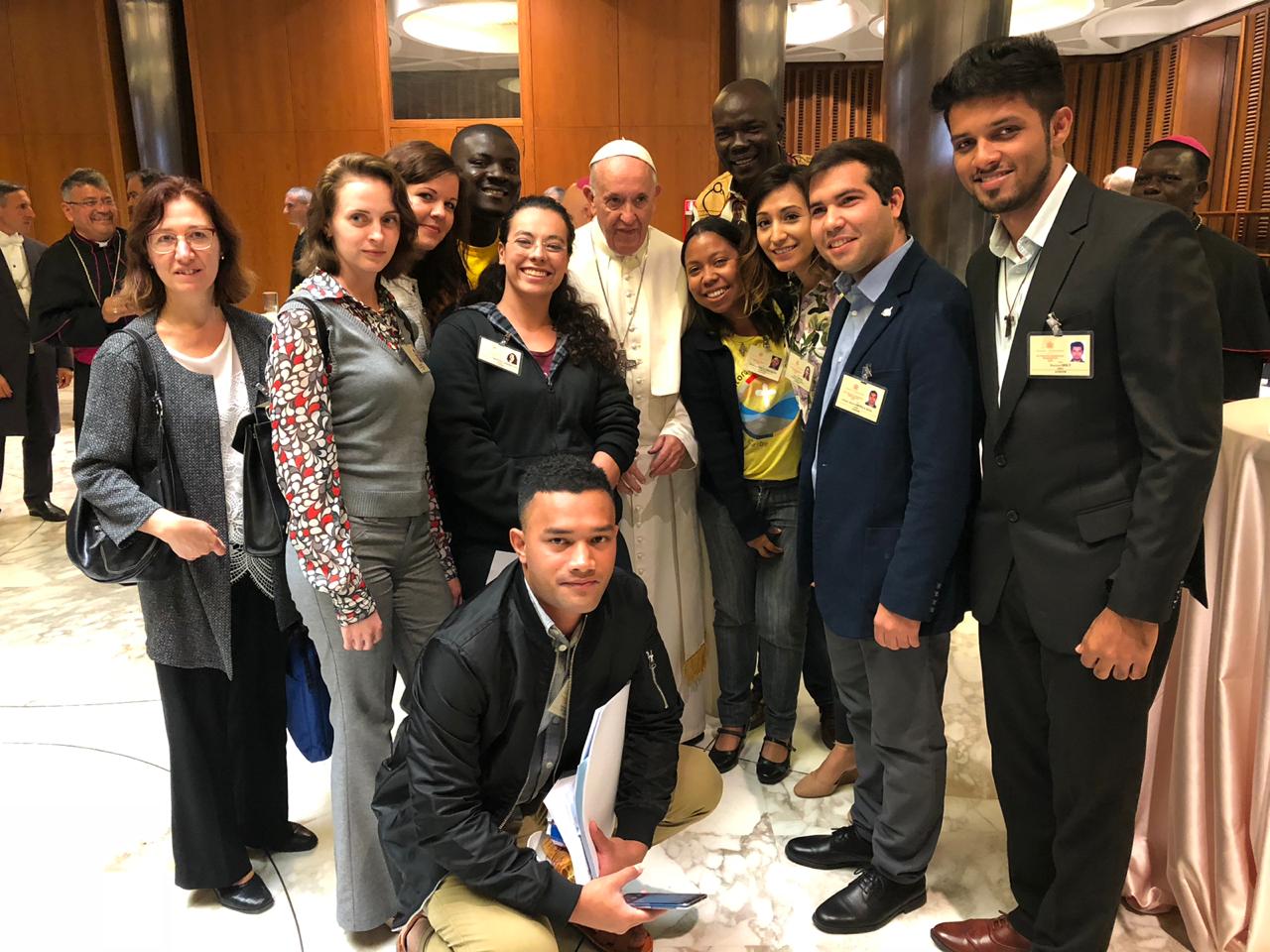
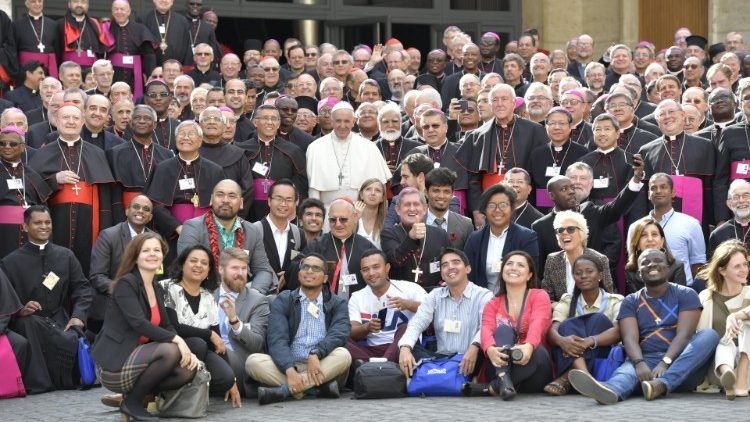
- By PERCIVAL HOLT (ICYM National President 2018-2020 & Synod Auditor)
It has been one year since ‘we journeyed together’ at the Synod on Youth in October 2018. In fact, the journey began in 2017 with the preparatory work. I recall receiving a questionnaire from the National office in my parish back then for all young people (lay, religious, students, working, rural, urban or whatever background) to fill up. It contained questions on several realities of young people, about social, political and spiritual life, our aspirations, perceptions and challenges in the current world etc.
I was part of the Synod journey since then, following which I had the chance to participate in the pre-synod meeting at Rome in March 2018, attended by 350+ young people from all over the world representing various backgrounds.
Again, it was in June 2018 that I received a direct invitation from the Vatican to attend the Synod as an Auditor to represent the voices of the young people of India and Asia. Thereafter, I began my personal preparation to be able to contribute to what I perceive as “the evolution of the Church through the People of God”. I was told that we would have to present our thoughts in four minutes during the Synod; so I took time to understand the pulse of young people. With this preparation, I set out on my journey to the Vatican. I was aware of the other Bishop delegates from India, as well as the Focolare representative (Ms. Cheryl Anne Menezes from India) participating in the Synod. I had no clue of what was going to happen in a Synod. However, all I knew that it was serious and I was prepared to offer whatever I could.
I landed in Rome on 2nd October. We were all set for the Synod to begin and as we walked into the Paul VI hall of the Vatican on the 3rd, we had already experienced enough to digest just when the land swept beneath our feet as we encountered Pope Francis at the doors welcoming each and every one personally, and this continued every day.
Finally the day was here, 270 Cardinals and Bishops, 40 young people (Auditors) from all over the world, 23 experts on youth affairs (psychologists, philosophers, theologians, social media, technology & science experts etc), in total 350 people to deliberate upon “Young people; their faith and vocational discernment” for four weeks. At the very outset when most of the young people were wondering about the proceedings, Cardinal Baldisseri in his welcome note said “This is not a parliament where we will fight on issues, but rather follow a methodology of speaking and listening guided by the Holy spirit in whose wisdom we rely completely. May this Synod be the work of the Holy Spirit and not of human minds”. Therefore, each of us only had the opportunity to present our views without countering others or debating.
We young people had the task of initiating a missed concern, while sometimes also redirecting the direction of some existing thoughts put forth. While the Synod continued in the Synod hall, a synodal family began to grow outside the hall - in breaks, free time, over dinner tables, encounters on streets that had its own beauty of exchange of thoughts.
The synod was diverse, the discussions even more unique. We young auditors were indeed happy with what emerged as the “final document” of the synod, after 3 weeks of intense work in assemblies as well as group discussions that further also became the foundation for the Apostolic Exhortation – Christus Vivit (CV) by Pope Francis. What amused us is the fact that Pope Francis was “listening” and made notes of his own, which are reflected by his words in CV.
The synod continues throughout the world, in different corners. There may not be huge transitions, but small attempts to create a difference. We witnessed this at the Post-Synod meet – The International Youth Forum in June 2019 at Rome, where again I was invited by the Dicastery for Laity, Family & Life to represent and share the experience of the Synod with 350+ young people from the globe.
Personally, I have witnessed many developments after the Synod, at least in India. Many dioceses, religious organizations as well as people have been putting together efforts – sharings, seminars, conferences, new initiatives, more involvement of young people, a synodal approach in youth ministry and so on. Many dioceses declared “Year on Youth” and are looking into new pastoral and practical projects of improving the ministry with the young.
I myself travelled across the country, the national team of young leaders also visited various dioceses, to share and help people grasp the synod and in-turn build a better, synodal and co-responsible church. I also wrote various articles, papers and presentations on the Synod, its implications, interpretation and the way forward.
The CCBI National Youth Commission of the Episcopal Conference of India (CCBI) has taken the Synod on Youth seriously and thus, deep interest to organize various trainings and formative sessions on the Synod and CV at national and regional levels. It also printed Christus Vivit in English at a very reasonable price of which about 4000 copies were sold. CV was also printed in several vernacular languages across the country and thousands of copies made available to young people. CV has also been the central theme in programmes such as the Annual Youth Ministry course for religious and animators as well as the National Youth Conference recently held in October 2019, for young leaders from across country. Some of the future plans for implementation of the Synod in India include ‘development of ample resource material on CV and the post-synodal recommendations’ as well as ‘revising the National guidelines for youth ministry in India from the post-synodal perspective’ whilst continuing trainings and formation programmes across all ecclesial forums.
The Synod family still exists, on whatsapp groups, via social media etc., where we continue to share our post-synod experiences, initiatives and programmes being done throughout the world.
Yet this is not enough, a lot more has to be done! It’s an ongoing process.
My only prayer and hope is that we may continue to spark the fire of the Synod and Christus Vivit in young people as well as the ecclesial structures of the church. May we continue to revive and rejuvenate the bride of Christ!
Christ is Alive!
Lay Ministry – not a service but commitment to the church
If they think of the lay vocation simply as a form of
service inside the Church: serving as lectors, acolytes, catechists
and so forth. They forget that the lay vocation is directed above
all to charity within the family and to social and political charity.
It is a concrete and faith-based commitment to the building of
a new society. It involves living in the midst of society and the
world in order to bring the Gospel everywhere, to work for the
growth of peace, harmony, justice, human rights and mercy, and
thus for the extension of God’s kingdom in this world. (Pope Francis in CV #168)
While Holy orders and consecrated life is the heart of God, lay ministry is the hands at work. It is a sacred calling, simply by Baptism to assist the Lord and His chosen ones (priests & religious), by building “social friendships” and “worthy relationships” with the world beyond the church. It is a call that requires (in given order) listening to the voice of God, the realization of being called to something greater than our own life; the reflection of being unworthy; the preparation to take up the mission; the effort to become worthier; the flexibility to be bent and broken by the Lord, again and again and thus, the grace to be fruitful & impactful.
A Lay minister always puts people before himself and focusses on God whilst living among people. He thinks not just with a human mind, but the heart of God. He acts not just with sweat of the body but blood that bleeds from the heart. He places the pain & sufferings of others before the struggles and desires of himself. He works for the betterment of others and not the glorification of himself. He bridges the gaps, fills the voids of the members of the hierarchy of the church. He assists the clergy & religious by stepping ahead in times and places they are restricted and bound. In definition, lay ministers are coworkers with the Bishop alongside priests and religious. They may be known as "lay workers", "pastoral assistants", etc. Therefore, as Pope Francis says in Christus Vivit, lay vocation is simply not providing service inside the church, but being the voice and hands of the Church in the secular world, hence being a calling above all, aimed at building a new society.
Now, I also want to differentiate between lay vocation and lay ministry. Vocation is one’s calling in life, which becomes ministry when one prioritizes it above other plans, dreams & offers in life. Every Baptized Christian has a calling to social friendships & love. But it becomes ministry when clubbed with pain, tears and sacrifice. Ministry has to involve the attitude of “selfless service” to others i.e. the constant reminder to one self that “Lord, I lay me down I’m not my own, I belong to you alone” (from the song Lay me down by Chris Tomlin; listen to it sometime).
Therefore, lay ministry includes:
- Passion, pride & perfection in the work (ministry) you are doing
- Willingness to be guided by passion & not provision
- Resisting temptations or making an effort to, at least
- Being content with whatever you get in return or even nothing
- Not competing or complaining about disappointments or negative forces
- An attitude of working for the Lord and his people, not others or fame
- Compromising on career, relationships & lifestyle
- Overcoming fear of failure & rejection
- Letting go off the steering wheel of your own life into the hands of God
- Accepting challenges and improving yourself each day
- Polishing yourself (your attitude, nature, feelings, reactions, skills and knowledge)
- Offering your intellect, education, skills & expertise for a cause of the Church
- Inculcating the art of “see, judge & act i.e. awareness, reflection, action & evaluation
- Courage to confront and challenge the negative forces at work against you
- The humility to be an empty pot and always say yes to be filled by the Lord and emptied onto others.
17 February 2021
Bethania, Faridabad
